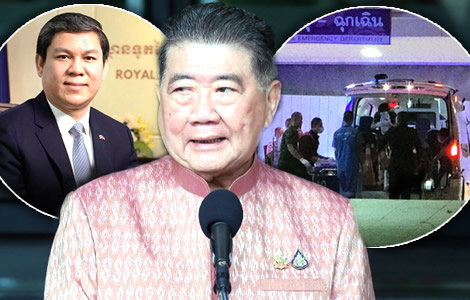Landmine blast maims Thai soldier near Cambodian border, prompting swift retaliation from Bangkok. Acting PM expels envoy, army seals crossings and tensions soar as fears of broader conflict rise. Thai military vows to defend sovereignty at all costs.
On Wednesday night, Acting Prime Minister Phumtham Wechayachai moved fast. He ordered Thailand’s ambassador out of Phnom Penh and expelled Cambodia’s envoy in Bangkok — Hun Saroeun, grandson of Cambodian strongman Hun Sen. The diplomatic blow came just hours after a second landmine blast rocked Ubon Ratchathani. The explosion, in a disputed border zone, left five Thai soldiers wounded — one lost his leg. Thai and Cambodian troops are now facing off in the area. In direct response, the Royal Thai Army sealed border checkpoints and ramped up security across the eastern frontier. Tensions are rising in Bangkok. Officials fear this second attack could ignite a wave of nationalist fury on both sides of the border. The Thai government isn’t backing down. The Ministry of Defence vowed to defend national sovereignty with force if needed — and to shut down any destabilising rhetoric from Phnom Penh.

A new crisis has erupted along the Thai-Cambodian border after a landmine explosion injured five Thai soldiers on Wednesday. The incident occurred in the disputed Huai Bon area, in Nam Yuen District, Ubon Ratchathani Province. This marks the second landmine blast in the region in just over a week.
The explosion took place at approximately 4:55 p.m. on July 23. Soldiers from the 14th Infantry Regiment were conducting a routine patrol. The patrol route was near Chong An Ma, a sensitive area with a history of past skirmishes.
Four Thai soldiers also injured by blast as army confirms attack happened inside Thailand’s own territory
At 5:18 p.m., Sergeant Major First Class Pichitchai Boonkhorat stepped on a mine. The explosion tore through his right leg. Emergency teams rushed him to Nam Yuen Hospital, where doctors were forced to amputate the leg.
Four other soldiers were also injured in the blast. Although they did not suffer amputations, they were clearly impacted by the explosion’s force. All four complained of chest tightness, tinnitus, and hearing problems. They were also admitted to Nam Yuen Hospital for observation and treatment.
The injured soldiers were identified as follows:
1 Private First Class Phisit Senasi – rifleman; symptoms: chest tightness, tinnitus
2 Private First Class Suphakit Phongthai – machine gunner; symptoms: chest tightness, tinnitus
3 Private First Class Seksan Lunchak – machine gunner; symptoms: chest tightness, tinnitus
4 Private First Class Chakkrit Buttae – grenade launcher; symptoms: tinnitus, hearing loss, earache
Notably, all five soldiers belonged to the 14th Infantry Regiment, part of the 2nd Battalion. According to military records, they were operating at coordinates VA 950 911 when the mine exploded.
Immediately following the blast, Thai authorities moved into action. Acting Prime Minister Phumtham Wechayachai responded by ordering a diplomatic downgrade. He recalled Thailand’s ambassador from Phnom Penh without delay. At the same time, he declared Cambodian Ambassador Hun Saroeun persona non grata.
Thailand expels Cambodian ambassador as mine blast prompts swift diplomatic retaliation from Bangkok
Hun Saroeun, the grandson of Cambodian strongman Hun Sen, reacted angrily. He posted a photograph of himself drinking and mocking the Thai government. However, his post was quickly deleted following a wave of public outrage in Thailand.
Meanwhile, Phumtham stated that this mine was “newly planted.” According to him, previous patrols had not encountered mines in the area. Therefore, he concluded that the current blast represented a new and deliberate escalation.
Consequently, the Ministry of Foreign Affairs was instructed to prepare a formal protest letter. The government also planned to send documentation to oversight officials of the Ottawa Treaty. Thailand argues that Cambodia’s actions breach international mine-ban obligations.
The Royal Thai Army later confirmed that the mine was a Russian-made PMN-2 device. These types of anti-personnel mines are banned under international law. Thailand insists that its forces have never deployed such mines, past or present.
Thailand to protest to Ottawa Treaty body as PMN-2 mines confirmed to be newly planted and Cambodian
In a strong statement, Army spokesperson Maj. Gen. Winthai Suvari accused Cambodia of violating Thailand’s sovereignty. He emphasised that the explosion occurred well inside Thai territory. Additionally, he said the act was a serious breach of peace and security.
While officials are still assessing the situation, concerns are mounting in Bangkok. On Wednesday night and early Thursday, senior officials gathered at Government House. They feared the incident could spiral out of control. Some believe further escalation is likely if diplomatic efforts fail.
In parallel, military commanders activated the “Chakrapong Phuwanart” emergency plan. This rarely used contingency was last implemented in 2011. At that time, Thailand and Cambodia clashed over the Preah Vihear temple.
Under this plan, the First and Second Army Regions are placed on high alert. Units from both regions are now reinforcing patrols and tightening security along the border. Officials say this move is precautionary, but tensions are clearly rising.
Thai military activates border emergency plan as fears grow over further escalation and rising tensions
In response to the incident, the 2nd Army Region closed several border crossings. According to Lt. Gen. Boonsin Phadklang, the closures took effect immediately. The following crossings are now closed: Chong An Ma, Chong Sangam, Chong Chom, and Chong Sai Taku.
Additionally, two popular tourist sites have been sealed off. These include Prasat Ta Muen Thom and Prasat Ta Kwai, both located near the frontier. Authorities said the closures are meant to prevent civilian casualties and possible provocations.
Meanwhile, demining efforts have begun in Huai Bon. Engineering battalions are clearing the area and marking potential danger zones. Army sources warned that dozens — possibly hundreds — of mines may still be buried.
The recent blast is not the first of its kind. On July 16, another explosion occurred in the Chong Bok area, also in Nam Yuen District. That incident injured three soldiers, one of whom lost his foot. Initially, officials thought the mine could be leftover from past conflicts.
Thai army shuts down multiple crossings as border mine threat continues to grow in conflict zones
However, further investigation revealed otherwise. Intelligence reports indicated the mine had been newly laid. It matched the same model as Wednesday’s device. As a result, Thai officials now believe the two incidents are linked.
Thailand’s army leadership has also warned the media. They urged outlets to report responsibly and avoid repeating Cambodian propaganda. Misinformation, they said, could inflame the already volatile situation.
Indeed, online rhetoric has already intensified. Both Thai and Cambodian social media users have exchanged accusations, insults and doctored images. Some Thai netizens accused Cambodian tourists of provocations near temples in Surin Province.
In Cambodia, the government has also ramped up its rhetoric. Prime Minister Hun Manet recently announced that his country would enforce a long-dormant draft law. Starting next year, Cambodia plans to conscript civilians into the military.
Thai and Cambodian online rhetoric escalates as officials link both mine blasts and urge media caution
He cited tensions with Thailand as the main reason. His administration is also expected to boost the defence budget. These moves have drawn criticism from regional observers, who fear the militarisation of the border.
Back in Thailand, domestic politics have also been shaken. Prime Minister Paetongtarn Shinawatra remains suspended over an ethics probe. She is under investigation for her handling of a phone call with former Cambodian leader Hun Sen.
In her absence, Acting Prime Minister Phumtham has assumed full crisis management responsibilities. So far, he has taken a hard line. He declared that Thailand will use “all available mechanisms” to defend its sovereignty and protect civilians.
Military commanders are echoing that stance. The Royal Thai Army stated clearly that it holds Cambodia accountable. It also emphasised that no further violations will be tolerated.
Bangkok political crisis deepens as Phumtham leads hardline stance on sovereignty and retaliation
As of Thursday morning, the situation remains tense. Soldiers continue to sweep the border zone for additional mines. Engineering units are focused on ensuring safe routes for patrols and local communities.
The Commander-in-Chief of the Royal Thai Army is expected to visit the site today. He will meet with injured personnel and assess the military’s next steps. Meanwhile, civil society has stepped in to support victims.
Gulf Energy Development Public Company announced a ฿1.2 million donation. The funds will be used to assist soldiers and their families affected by the blasts. Additional fundraising campaigns are also underway.
Military blasts Cambodia for breaching international law by planting mines, which injured 3 soldiers
Thai soldier loses leg stepping on landmine on patrol at the Thai Cambodian border in Ubon Ratchathani
Army private who lost foot promoted to Sergeant as probe into the origin of the Russian mine is opened
Despite efforts to de-escalate, the risk of further incidents remains. Thai officials warn that one misstep could ignite broader conflict. Accordingly, diplomatic channels remain open, but the tone is increasingly strained.
Undeniably, the landmine explosion has significantly worsened Thai-Cambodian relations. Both governments are now locked in a delicate balance of retaliation and restraint. Observers hope that cooler heads will prevail — but the situation on the ground and among a growing number of nationalists on both sides suggests otherwise.
Join the Thai News forum, follow Thai Examiner on Facebook here
Receive all our stories as they come out on Telegram here
Follow Thai Examiner here
Further reading:
Military blasts Cambodia for breaching international law by planting mines which injured 3 soldiers
Dangerous impasse between Thailand and Cambodia as PM rules out International Court of Justice (ICJ)
Hun Manet confirms Cambodia ultimately may decide to send border dispute with Thailand to the Hague
Khmer soldier killed in deadly gunfire between Thai and Cambodian armies near Ubon Ratchathani
Thaksin to address state board on drug suppression despite howls of protest from human rights groups
Health Minister Somsak launches regulatory blitz to outlaw non-medical cannabis use within 40 days


















